We take the word king seriously in Memphis. This is the city where Elvis Presley rose and Martin Luther King Jr. fell, the former providing an international brand, the latter an eternal wound. Only with more than 30 years of hindsight does Jerry Lawler seem to have earned his chosen moniker in the quasi-sport of professional wrestling. King is royalty in this town, to say the least.
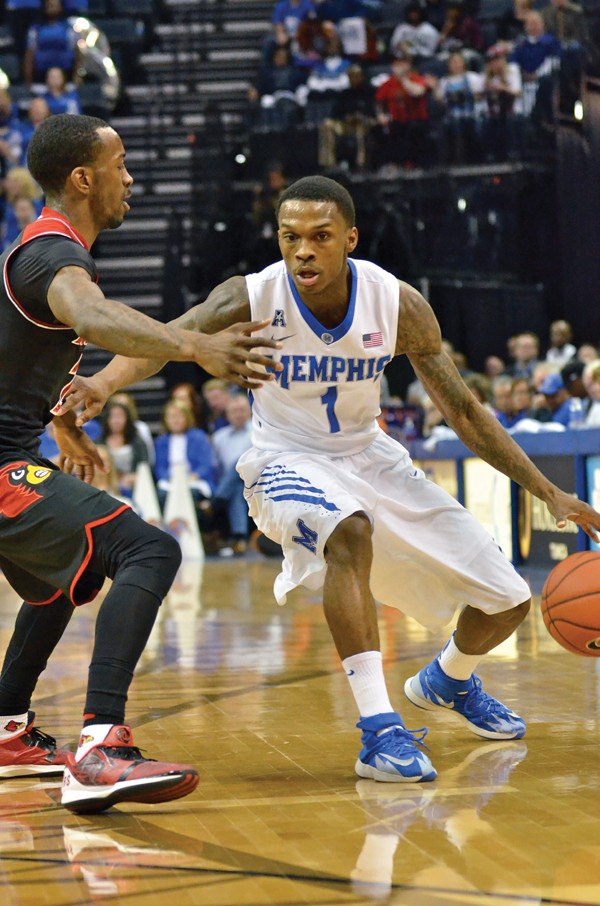 Larry Kuzniewski
Larry Kuzniewski
As a sophomore basketball prodigy at White Station High School, Joe Jackson had “King of Memphis” tattooed across his chest. He’s been fighting to meet that standard ever since.
The high school credentials were indeed regal. Jackson led the Spartans, under coach Jesus Patino, to three straight Class 3-A championship games, scoring 35 points as a junior against Raleigh-Egypt to win the 2009 title. (The Spartans fell to Melrose — a team led by Jackson’s future college teammate, Adonis Thomas — in the 2010 championship.) Over the course of his four years in green and gray, Jackson scored 3,451 points, the second most in Shelby-Metro history and fourth most in Tennessee history. Jackson became only the second Memphis basketball player to earn All-America recognition from both McDonald’s and Parade, the two most prestigious such teams in the country. (The first was Northside’s Richard Madison in 1984.) As a consensus top-15 recruit, Jackson ignored suitors across the country and made the decision his hometown wanted and expected when he committed to play for second-year coach
Josh Pastner and the Memphis Tigers.
“It’s been quite a ride,” says Jackson, as he embarks on a final postseason as a college player. “Especially my last two years. Being able to play at home, you don’t realize what a blessing it is, until you have to leave your hometown and get a career going.”
Longtime Tiger booster — and proud U of M alum — Harold Byrd has watched Jackson grow up, both as a player (Byrd sits a few rows behind press row at FedExForum) and as a community asset. And Byrd is unabashed in describing Jackson’s importance to the Memphis program.
“Joe and Elliot Perry had their choices of schools to attend but didn’t even think of going anywhere else,” says Byrd. “Other coaches might get a player or two over time, but Memphis, for the most part, owns Memphis. And that’s because of the legacy Elliot, Joe, and others have nurtured. The players feel and see the love of the fans, the high regard former players occupy in the city … the hurricane-force delirium swirling around them daily like movie stars. When a [local] player plays for Memphis, the resonance and impact of being a Tiger is one that permeates his entire life.”
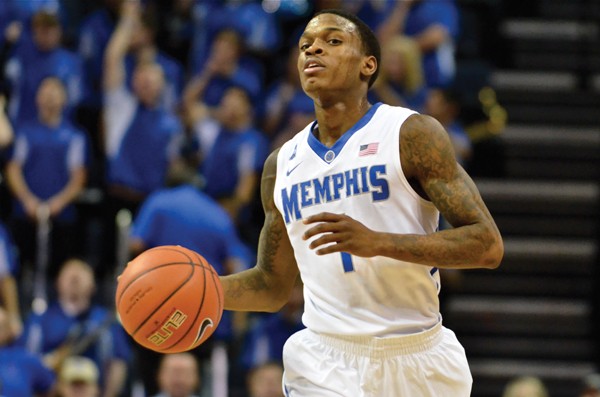 Larry Kuzniewski
Larry Kuzniewski
“I didn’t fully understand it,” says Jackson, reflecting on the intensity of the spotlight on Tiger basketball in Memphis. “How severe it was going to be. Not until I got here. I wish I would have. I wouldn’t have let so much get to me [freshman year]. People want you to do this, do that. When everybody knows you, it’s a good thing, but it can be a bad thing, too. I spent two years just trying to understand that.”
Jackson will finish his college career with achievements only a select few Tigers can claim. He and Perry are the only Tigers to accumulate 1,500 career points and 500 career assists. He and Keith Lee are the only Tigers to twice be named MVP of a conference tournament. (As a freshman, Jackson clinched the 2011 Conference USA (C-USA) title and an unlikely NCAA tournament berth for the Tigers by burying two free throws with 7.8 seconds left in the game against UTEP on the Miners’ home floor.) The only Tigers to make more free throws than Jackson — Perry, Lee, and Larry Finch — have their jersey numbers hanging from the FedExForum rafters. In leading Memphis to an undefeated run through C-USA in 2012-13, Jackson was named the league’s Player of the Year. Entering this week’s American Athletic Conference tournament, Jackson is eighth on the school’s scoring chart with 1,655 career points.
Jackson takes considerable pride in what his Tiger teams have accomplished — he’s particularly attached to that unlikely 2011 C-USA title — but his devotion to basketball goes deeper than the standard “love of the game.” In many respects, Jackson’s devotion to the sport has been a business decision.
“The game chose me to play,” says Jackson. “I didn’t necessarily choose it. I know I can play basketball. I want to be able to make money off this game. I’ve got two younger sisters, and their father isn’t in their lives. My grandma is about to retire. There are a lot of family issues I can help with. I’m smart enough to get a regular job, too, but I’m young. Fresh legs.” (For what it’s worth, Jackson says his favorite college class was accounting.)
“I think Joe has exceeded expectations,” says Pastner. “He’s the most scrutinized player in the history of this program. There have been some great players here, but no player has come in with Twitter, Facebook, and the amount of coverage via TV, radio, and print. And in his hometown. When he got here, there was no upper class; we were just trying to hold it together. His class has won over 100 games, and Joe graduated in three years.”
So why do some feel Jackson has come up short as a college player? Armchair analysts love the Joe Jackson phenomenon for its extremes. After the Tigers beat Louisville on March 1st — their second victory over the reigning national champs in less than two months — some chose to focus on how poorly Jackson played, that he wasn’t on the floor for the Tigers’ 15-1 run to close the game. These analysts didn’t mention that Jackson led Memphis in scoring and assists when the Tigers won at Louisville on January 9th.
“Joe wants to win. He’s a warrior, a competitor,” says Memphis senior guard Michael Dixon.
Jackson won 109 games as a Spartan. Through the end of the Tigers’ regular season, he’s won 105 with the University of Memphis. Jackson has been a winner, and a difference-maker. If the Tigers reach 25 wins this season (they’re 23-8 entering the AAC tourney), it will be eight years in a row for Jackson’s teams. Nonetheless, there have been stumbles.
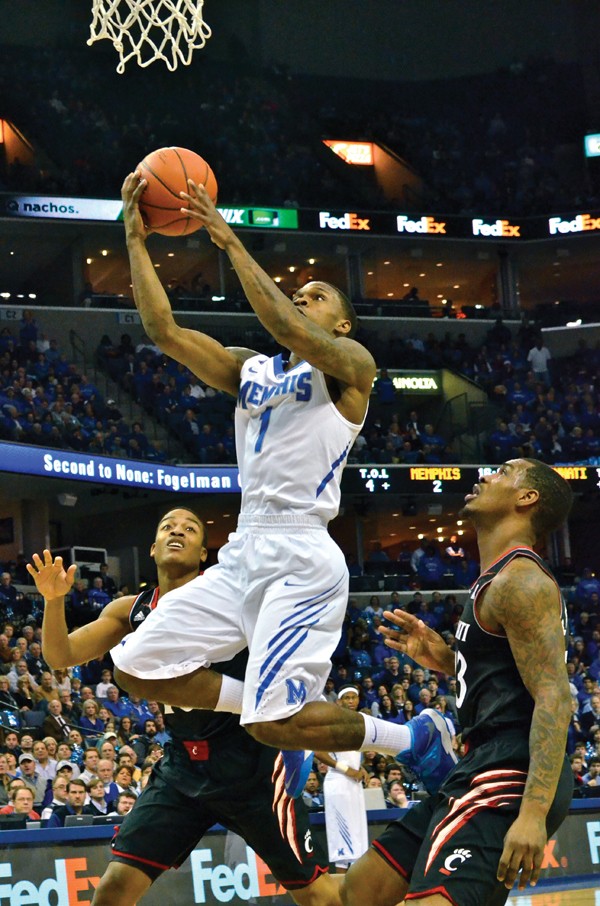 Larry Kuzniewski
Larry Kuzniewski
On New Year’s Eve in 2011 — Jackson’s sophomore season with the Tigers — the U of M beat Charlotte at FedExForum with no Joe Jackson to be seen. He wasn’t sick, injured, or suspended. Just unhappy. (He’d taken only two shots and been held scoreless in the Tigers’ previous game against Robert Morris.) He returned and helped his team beat Tennessee four days later, but came off the bench the next 14 games behind Antonio Barton. It was no place for a king.
“I was so stressed out,” says Jackson. “I don’t think I can get to a lower point in life than that. I have family here, and I wasn’t raised with a silver spoon. They depend on me, and I don’t mean financially. I’m the lift they get when they feel I’m doing well. And when things don’t go well … My first year here, we were just trying to fix this program. Just because Joe’s here, doesn’t mean everything’s going to be dandy and gold.”
“He was struggling,” says Pastner. “It was strictly basketball. He was listening to a lot of people, and he wasn’t two-feet in on the caravan. I told him to step away, take 24 hours. Don’t come to the game, and decide if you want to be two-feet in. I didn’t want to lose Joe, but no one’s ever bigger than the program. He came back and, to his credit, it may be something that helps him the rest of his life. He shut out the negative that was in his ear. No more blame game. When he eliminated that mental clutter, he really took off.”
“I’ve seen Joe do a lot of crazy things, and that just added to the list,” says Memphis senior guard Chris Crawford.
The Tigers trailed Gonzaga by 11 points with 13:45 to play on February 8th, Joe Jackson’s 22nd birthday. In front of more than 18,000 fans at FedExForum and a national TV audience — ESPN’s “GameDay” crew was on the scene — the Tigers appeared to be the lesser team in a Top 25 match-up that was significant for each team’s RPI ranking. Bulldog center Przemek Karnowski — all 7’1″ of him — received a pass on the low block from teammate David Stockton. The Polish giant rose to the rim for a slam dunk — only to be met by Jackson. The 6’1″ point guard (as he’s listed in game programs) deflected the ball just enough for Karnowski to lose possession. The crowd roared, and Memphis outscored Gonzaga 29-12 the rest of the way.
After the game, the birthday boy was typically understated in describing a play most Memphis fans will remember as The Block. “Shaq Goodwin has a bad habit of gambling,” said Jackson with a smile. “He fronted the post, and I knew that was John Stockton’s son making that pass. I just tried
to make a play on the ball. Honestly, I was trying not to get dunked on; he was so close to the rim. I jumped to block it, and I was successful that time. That kind of changed the game.”
Pastner’s favorite Jackson moment came on Senior Day in 2013, when the Tigers hosted UAB with a chance to complete an undefeated season in C-USA play. “When Joe got here he was not a good 50-50 guy,” says Pastner. (A “50-50” ball is loose and could be recovered by either team.) “That day he won eight 50-50 balls. One time the ball went past halfcourt, and Joe was running with a UAB player. He dove face first, got the ball, and called timeout. Joe came to the bench and I gave him a huge hug. He said, ‘Coach, all I was thinking was that you’ll show that play over and over in Monday’s film session.’ It was a prized moment.”
“Joe’s the leader, our number one. He does what he’s supposed to do,” says Memphis sophomore forward Shaq Goodwin.
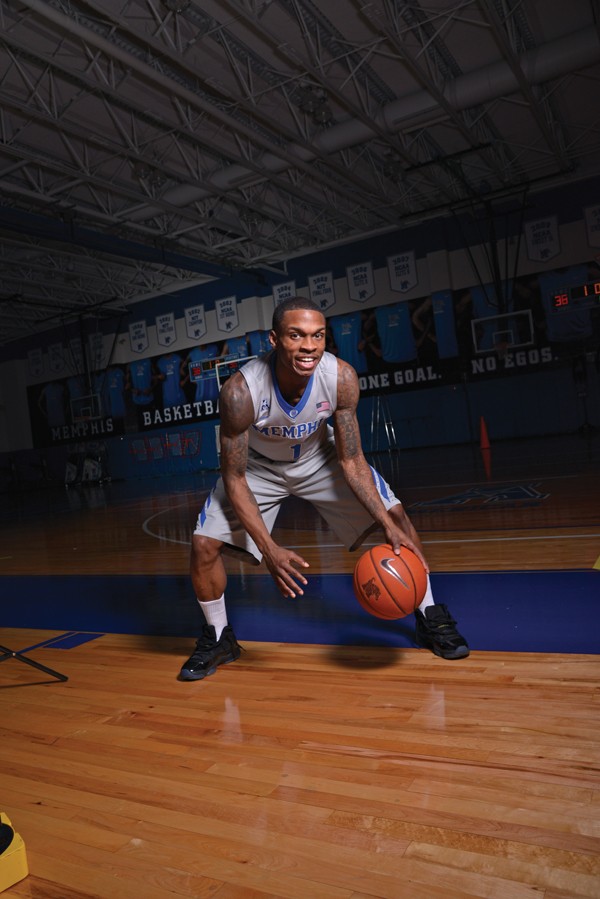 Larry Kuzniewski
Larry Kuzniewski
Maybe that’s the elusive quality in defining the fabled legacy of Joe Jackson: what he’s done vs. what he’s supposed to have done. Does Jackson need a deep NCAA tournament run to cement his place in the pantheon of Tiger stars? Consider the case of Perry, a member of anyone’s Mt. Rushmore of Tiger greats. He may be one of only two Tigers to score 2,000 points, but Perry only reached the NCAA tournament twice and won a single game in the Big Dance (as a freshman in 1988). Jackson and teammate Chris Crawford will become only the sixth and seventh Tigers to play in four NCAA tournaments. (The previous five: Keith Lee, Andre Turner, Baskerville Holmes, Antonio Anderson, and Robert Dozier.)
Pastner’s take: “The only thing that’s missing for Joe — because he’s racked up a lot of individual hardware — is a deep NCAA tournament run. It’s ‘The Road to the Final Four,’ not ‘The Road to the Regular Season,’ so I get that. Players are judged on what they do in the NCAA playoffs. But anyone in the profession understands the long haul of a regular season and all the success and numbers Joe has put up. There’s no reason Joe’s number shouldn’t be hanging from the rafters when all is said and done. But the final chapter hasn’t been written yet.”
“I understand now,” says Jackson. “It was never ‘Joe Jackson isn’t good enough.’ It was just too early with too many expectations. That’s all it was. It’s not easy to make it to the Final Four. I think we have a chance; we just have to take care of business. It’s on us. Everything has to come together at the right time.”
As Jackson’s college career nears the end, Byrd recalls fondly a chance encounter — in traffic — when the player was still an underclassman. Jackson had pulled up next to Byrd at a stoplight and began waving at him, a huge smile on the rising star’s face. “Joe reminded me of a sweet little kid,” says Byrd, “unsure, looking for acknowledgment and approval. I’ve often thought of this chance meeting, knowing the pressure Joe has felt as the player, carrying the weight of hopes and expectations for one of the most demanding fan bases in the country.”
And about that tattoo. “People took it the wrong way,” says Jackson. “I know Penny Hardaway is the best player to come out of Memphis. But if you’re going to look at [a tattoo] every day, it should keep you confident. Who doesn’t want to be a king?”
Like Larry Finch, Jackson grew up in Orange Mound. Like Penny Hardaway, Jackson learned right from wrong at his grandmother’s side. Like Finch, Hardaway, and Perry, Jackson chose to play college basketball under a microscope in front of friends and family, embracing the love he came to know as a youth along with the expectations he knew would come the first time he donned a Tiger uniform. Those expectations have followed Jackson for four seasons now, somehow growing with every season-ending disappointment he and his team have met in the NCAA tournament. Joe Jackson has one more March as a Tiger. One more Big Dance. What they say is quite true: Uneasy lies the head that wears a crown.
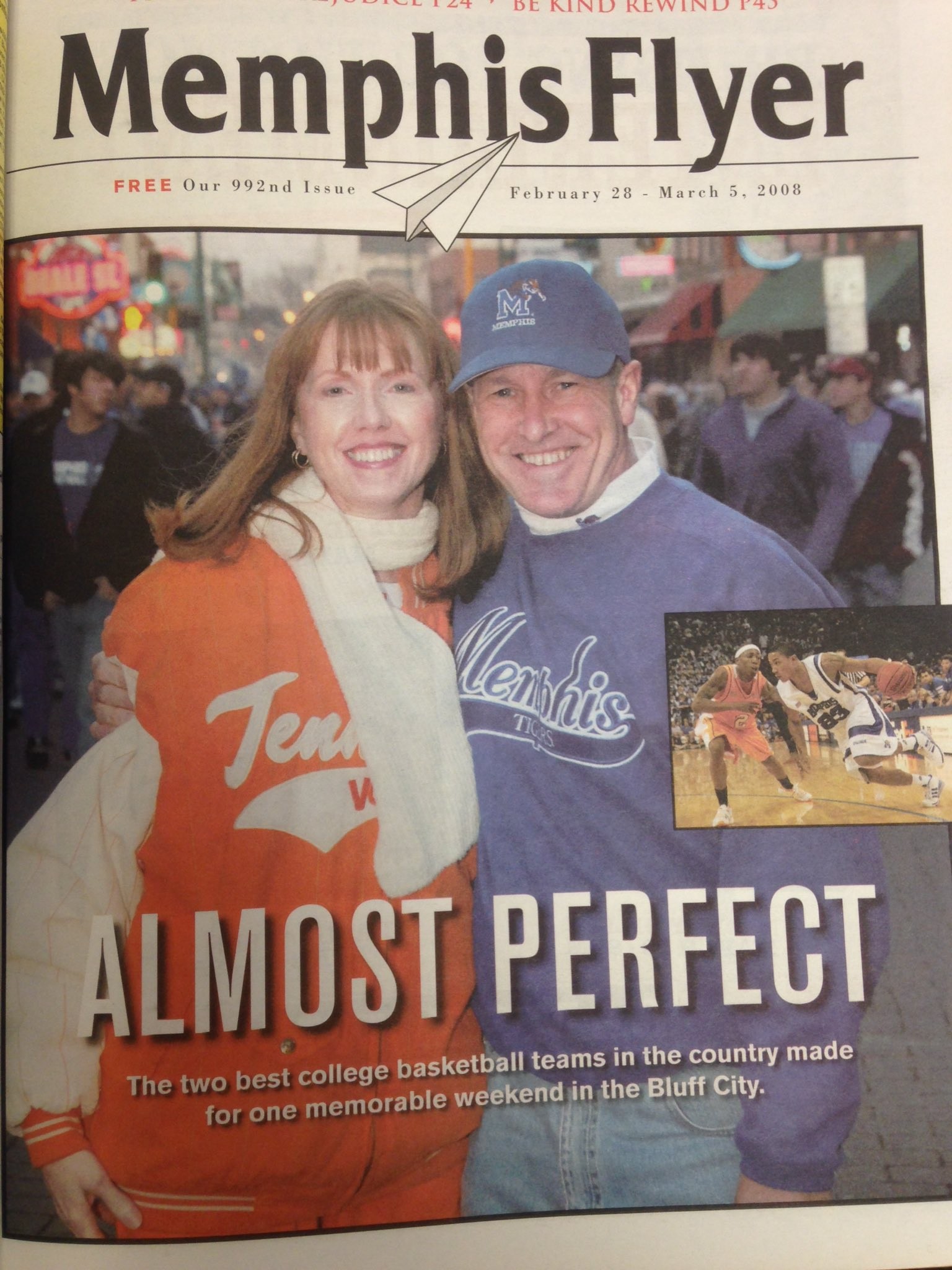 Larry Kuzniewski
Larry Kuzniewski 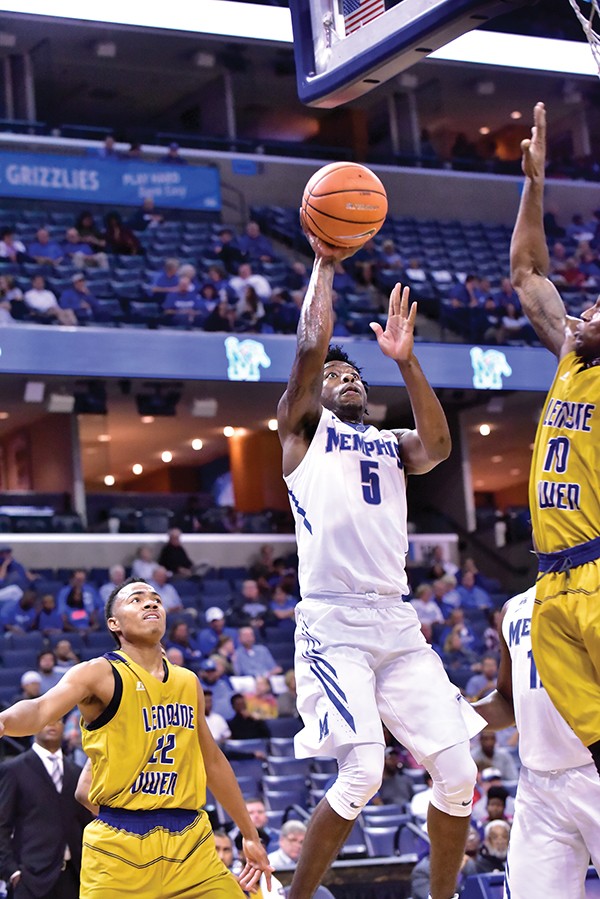
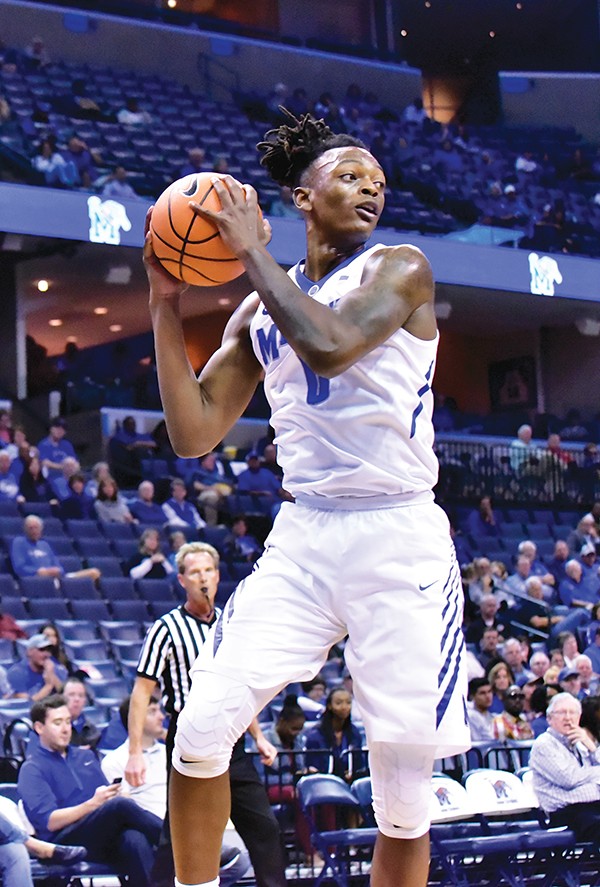
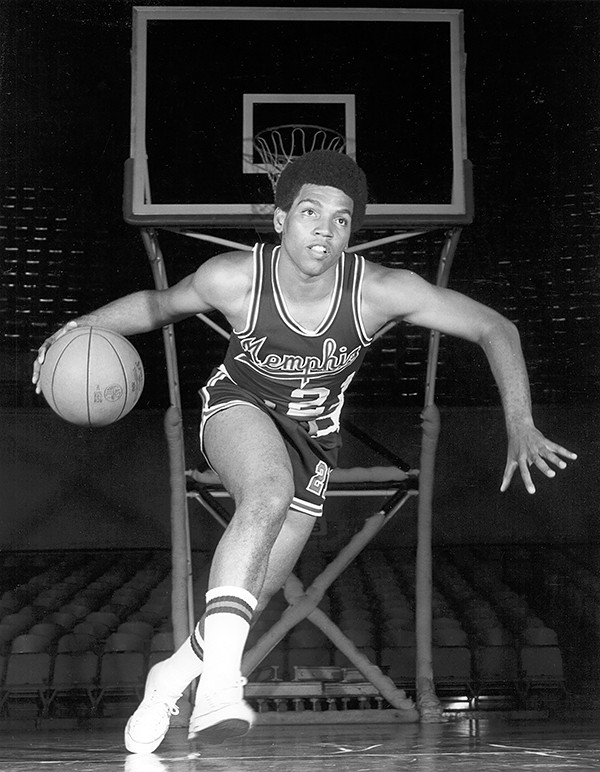 Courtesy U of M Athletics
Courtesy U of M Athletics 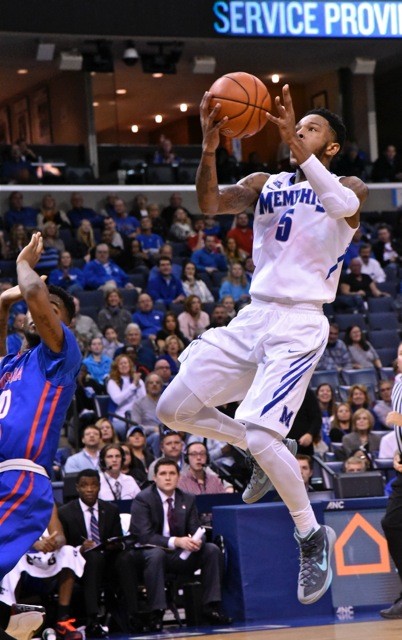 Larry Kuzniewski
Larry Kuzniewski  Larry Kuzniewski
Larry Kuzniewski  Larry Kuzniewski
Larry Kuzniewski  Larry Kuzniewski
Larry Kuzniewski  Larry Kuzniewski
Larry Kuzniewski